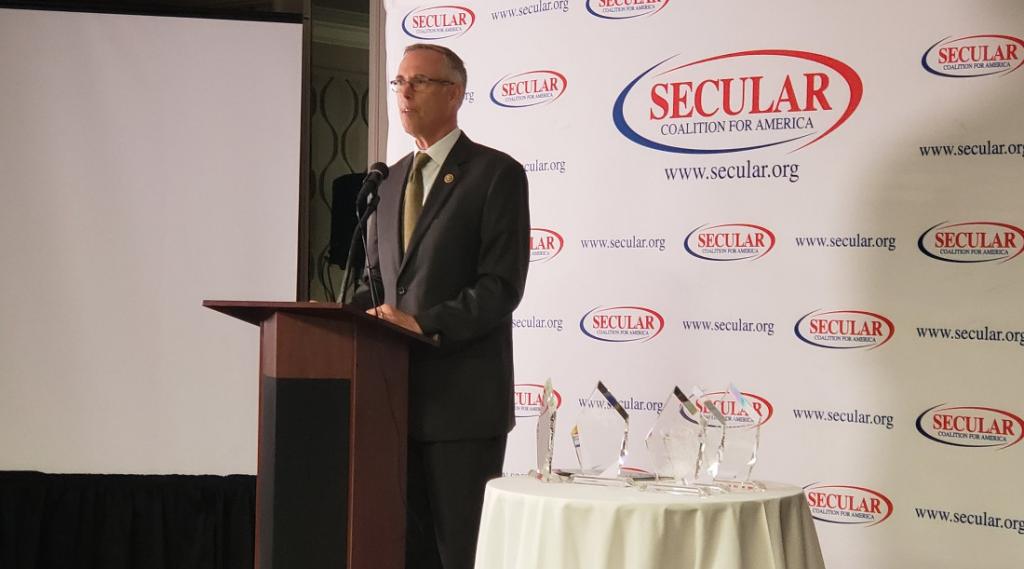***Update***: The Chair and Co-Chairs of the Congressional Freethought Caucus include Rep. Huffman, Rep. Jamie Raskin (D-MD), and Rep. Jerry McNerney (D-CA).
…
The U.S. Congress will soon have a caucus — a group of legislators that gets together to promote common interests — dedicated to reason and science, the secular government our founders envisioned, and issues concerning non-religious Americans.
You would think, given how there are caucuses for everything, we’d already have one of these. After all, there are caucuses for cement, chickens, and rugby. But until now, there’s been nothing for members of Congress without organized religion.
The newly named “Congressional Freethought Caucus” was announced last night during the Secular Coalition for America’s annual Awards Dinner in Washington, D.C. Rep. Jared Huffman (D-CA), the sole non-theistic member of Congress, broke the news while accepting the SCA’s 2018 Visibility Award.

While video of Huffman’s speech isn’t available at the moment, he shared the mission statement of the new group.
“The Freethought Caucus exists to promote public policy based on reason and science. To protect the secular nature of our government and to oppose discrimination against atheists, agnostics, and religious seekers.“
The caucus will also “provide a forum for Members of Congress to discuss their moral frameworks, ethical values, and personal religious journeys.”
The reaction from the SCA was, as you’d expect, one of celebration:
“The formation of a Congressional Freethought Caucus is a milestone moment for nonreligious Americans in our continued struggle for inclusion in the political process and recognition as a constituency,” said Larry T. Decker, Executive Director of the Secular Coalition for America. “We are living in a time when one-quarter of Americans identify as nonreligious and yet, despite these demographic changes, our community is still disparaged, stigmatized, and underrepresented in elected offices at every level of government. By proudly and unapologetically identifying as nonreligious, these Members of Congress have struck a powerful blow against the de facto religious test that keeps so many secular Americans from seeking public office. We applaud the founding members of the Freethought Caucus for their courage and look forward to working with them on Capitol Hill.”
The caucus came together after conversations between Huffman and representatives from the American Humanist Association and its advocacy arm, the Center for Freethought Equality.
“The American Humanist Association and the Center for Freethought Equality were honored to be participants in the organizational meetings held to create and define the objectives for this caucus,” said Roy Speckhardt, executive director of the American Humanist Association, a member organization of the Secular Coalition for America. “The very existence of this Congressional caucus for freethinkers and humanists is a marker of how far the movement for secular and nontheist equality has come. This significant step is also a new beginning for our country as both religious and non-religious leaders work to better the nation.”
We need those things more than ever these days. So more power to Huffman as he gets this thing off the ground.
In the meantime, I have a few questions…
Which members of Congress will join this caucus?
While you don’t have to be an atheist to defend the rights of the non-religious, I wonder if more elected officials will follow Huffman’s lead and let it drop that they don’t believe in God. Even if they don’t, though, will others openly associate with the “atheist caucus”? Last night’s speakers for the predominantly atheist crowd included Sen. Mazie Hirono and Rep. Tulsi Gabbard. I assume they’d join. Who else?
Will any Republicans join the caucus?
The issues the CFC is promoting aren’t partisan, yet I can’t imagine any current Republican joining the group. It’d be heresy among many conservatives to even suggest atheists have anything to worry about since the standard GOP line is that Christians are the ones facing all the persecution.
What effect will the CFC have on legislation?
In this term, I’m guessing none at all. But in the future, this is a group that could push for more inclusive invocations in the House, fight back against legislation allowing religious groups to discriminate while receiving taxpayer funding, and urge administrators of science-based agencies to have some respect for science (looking at you, Scott Pruitt).
Will the CFC provide an adequate counter-weight to the enormously powerful Congressional Prayer Caucus?
The CPC currently has more than 90 members, a paid staffer (members contribute to that person’s salary), and a separate non-profit foundation. These are the people who always whine about “religious freedom” (which always amounts to Christians getting whatever they want) and getting “In God We Trust” plastered everywhere. In this administration, especially, these members have a lot of sway. Any group on the opposite side of the spectrum would be a breath of fresh air.
Does the CFC need a slogan?
I suggest “thoughts, not prayer.”




It’s Moving Day for the Friendly ..."
It’s Moving Day for the Friendly ..."
It’s Moving Day for the Friendly ..."
It’s Moving Day for the Friendly ..."